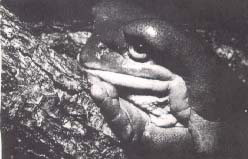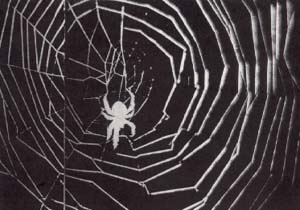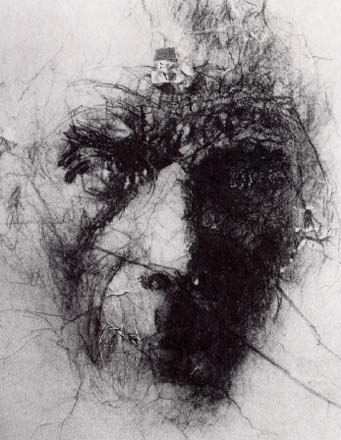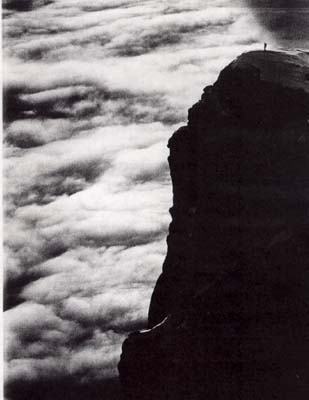

 Clara Feliciano also
recreated his world from the stench of Paris to the loneliness of this mountain:
Clara Feliciano also
recreated his world from the stench of Paris to the loneliness of this mountain:  The following is her recommended bibliography:
The following is her recommended bibliography: 


A page turning, stomach turner accurately describes Patrick Suskind's novel Perfume. Suskind's revolting visual imagery captures the olfactory sense of the reader thus dragging him into the fictitious, yet plausible, world of hideous stench. Once inside this malodorous hell, Suskind panders to the readers' baser instincts through the novel's protagonist, Jean Baptiste Grenouille.
From the novel's onset, Suskind, a consummate storyteller, ushers his audience, through the use of very vivid detail, to the bowels of the netherworld where evil incarnate, Jean Baptiste Grenouille, waits to emerge. The gruesome description of Grenouille's birth and separation from his amoral mother by a butcher knife forebodees the manifestation of extremely unpleasant future events. At this sadistic conjuncture, Suskind integrates the first of his commentaries on life-- a child is the direct product of his environment-- into Perfume.
Grenouille's infancy and childhood set the stage for the good vs. evil theme that is ever present throughout the novel. The evil monster, Grenouille, at the tender age of only a few months, conquers the good priest, Father Terrier, by staring intently with his nostrils, thus provoking a triumph for Grenouille, abandonment. When years later Ms. Trenelle sells Grenouille to Mr. Grimal, Grenouille embarks on his quest for the perfect scent. It is here that Grenouille's reign of terror begins.
Suskind's historical account of Grenouille's unassuming encounter with the "higher principle" is mesmerizing. Grenouille's pantherlike motions when possessing the "higher principle" and experiencing "happiness" for the first time depict an early stage of debauchery, which continues to manifest itself throughout the novel. In light of Grenouille's actions, one assumes that Suskind has created a monster that loves and enjoys possessing stereotypical, innocent and remarkable beauty, which is disappointing because beauty is by far the most easily and superficially admired; uncommon beauty is not.
Incorporated into the text as comments by the perfumer and glover Baldini, the only person in the entire novel who acknowledges Grenouille's exquisite gift of smell, are two other views on everyday life. The first, "You were surprised for a moment by your first impression...," and the second, "God gives us good times and bad times, but he does not wish us to bemoan and bewail the bad times, but to prove ourselves men," are both thought-provoking. These respites are masterfully intertwined in this horrific tale of stench and death.
As this novel of perdition proceeds, Baldini exploits Grenouille, thus a battle of evil against evil ensues. Althought the reader prognosticates Grenouille as the ultimate "winner," Suskind grabs his audience's attention with the vilest description of an impromptu illness that befalls Grenouille. The grotesque visual images that Suskind conjures up are repulsive and effective. Through Suskind's creative depictions, it is possible to "see" and "smell" the evil seeping out of Grenouille's body and then soaking deeper into the depths of his soul and flesh.
In the second part of Perfume, Suskind recapitulates in one sentence Grenouille's infancy and early childhood: "To enhance the mood he first conjured up those that were earliest and most remote: the hostile, steaming vapors of Madame Gaillard's bedroom, the bone-dry leathery bouquet of her hands, the vinegary breath of Father Terrier, the hysterical, hot maternal sweat of Bussie the wet nurse, the carrion stench of the Cemetiere des Innocents, the homicidal stench of his mother..." It is here that Suskind effectively ties the second part of his novel to the first and re-emphasizes the premise that a child is the direct product of his environment.
Encased in Part II of Perfume lies brilliant imagery of nightmarish proportions. Grenouille's self-imposed hibernation is riveting. One's olfactory sense goes "off the scale" when the idea of a man wearing the same rotten clothes for seven years is not able to permeate the earth and is again expelled from the guts of hell. It is understood as we explore Grenouille's hell that he is not welcomed there. In essence, Grenouille metamorphs from "brutalized beast" to "well-proportioned human being" throughout Part II, while the reader progresses through continual olfactory assaults. Surprisingly enough, although the environment is most foul, Suskind's language remains beyond reproach, for the most powerful vulgarity he uses is "shit."
The third part of Perfume showcased by Grenouille's killing spree, although well-concocted, tends to be slow-moving and boring. Only when Grenouille slays Laure Richis does it recapture the momentum of the first two parts. Afterwards, through the world's "acceptance" of Grenouille, Suskind sets the stage for Part IV's bizarre twist.
Suskind leaves the best for last, as the reading audience "smells and tastes" its way through Part IV of Perfume. Grenouille's final acceptance into the world of which he desires to become a part, in turn, transports him through the bowels of humankind and into the uncharted depths of the netherworld.
Amidst brilliant narrative and grotesquely vivid imagery, Suskind presents a unique view of life's contradictions in that God's greatest gift to Grenouille, an exquisite olfactory sense, bar none, proves to be the greatest of Grenouille's weapons against good. The theme of good vs. evil is thoroughly consumed at the end wherein hell's finest "perfumer" fails to "smell" his impending doom.
I was amused by Patrick Suskind's Perfume. Many times I caught the scent of familiar monsters. Initially introduced as some devil's spawn, or demonic child, Jean-Baptiste Grenouille, the fiend, goes through many horrific manifestations. He is seen as a wraith or Invisible Man passing among people unnoticed. He spends some time held up in a dark hole like some Tolkienesque Gollum. Mr. Hyde comes to mind, as well as the killer in "The Silence of the Lambs," who uses the husks of dead women to transform himself. I can also visualize some abominable antichrist or the Devil himself.
At first I suspected a Rosemary's baby, or a Damian from the Omen, but the more horrible situation became apparent: he is a human being. He is that sort of human being capable of unspeakable evil. He strikes fear in those that know him for what he is: the wet nurse, Father Terrier, the children in Madame Gaillard's boarding house, all put distance between themselves and Grenouille.
In the first fifty pages we watch this creature manifest itself. By this time, he is fifteen, and has literally murdered innocence. To satisfy his heightened sense of smell, he kills a young girl on a whim, or should I say whiff. I began to think it is his world, his upbringing, or his situation that has made him this way. Then he is immediately transported into the bourgeoisie class, yet remains the same.
Here I suspected he would come around. I expected him to have desires and passions resembling a debauchery I could relate to. All too soon he has the idea he will boil the fragrance out of young virgins. I envisioned some sadistic cauldron, but I dismissed it as absurd. He tried to distill hair, blood, and fish, thinking he would wrest their scents from matter. I knew he wouldn't flinch when he dumped the gray putrefacted bodies from his giant alembic. He is a ghoul.
When he leaves Baldini's, I sensed the pattern he has been leaving in his wake, but I was unprepared for the swiftness of the destruction. Madame Gaillard's demise was long and lingering, and Grimal the tanner's short and typical, but Baldini's annihilation was awesome. It was as if part of Grenouille's past has been blotted out. Baldini and his house were sucked into some nether region. Instantly.
The pattern repeats throughout, with the Marquis disappearing into thin air, and then Druot being quickly and quietly put to deasth. It seems they all vanished, like puffs of smoke. Grenouille too. They lingered a while, and then were just snuffed out.
After Baldini's demise, I thought some comprehensible course would follow. Grenouille has journeyman's papers. He will lead some semblance of a life. He will take up work and be some odd, hideous craftsman, strangling and boiling young women in his basement. Then a twist: he becomes a hermit.
High on a mountain he receives demonic revelations. He creates and destroys worlds in some psychotic mental masturbation. He discovers his own self-loathing. He tries to escape from himself by re-entering the world.
He stumbles into the high life again, and again I think he will now grab the gold ring. I think he will ride the Marquis, and his ilk, to some high-flown debauchery. My hope is left to evaporate on the wind, quite like the Marquis. Grenouille pursues his strange desire: to learn to rob life of its essence.
In Grasse, his existence is nondescript. He blends odors so as to manipulate the common folk. Some catshit, and a piece of moldy cheese, and he gets what he wants: anonymity; serivce; pity; position.
Naked, hairless dead virgins litter the coutryside. We are not invited. What is he doing? I suspected elaborate vats for denaturing his victims. Again, I am confused about his methods. His debauchery involved only smell.
Not sight. He doesn't look at them. Not sound. He bludgeons them before they speak or while they're asleep. Not taste, or touch. He has no real physical contact with them. It is unnerving that he behaves thus. What is he? He is not human. The Devil perhaps?
The Devil Incarnate. The Devil made flesh. The Antichrist. No, he is human. He is small, selfish, contemptible, pitiful, cowardly, ugly, useless, malignant, loathsome, etc. Grenouille is all those things each of us can be is we let ourselves. I have seen each one of these traits in myself, and in others. Never for any length of time. And never all at once. But I have seen these things.
In the Isa Upanishad it states: "There are demon haunted worlds. Regions of utter darkness." The sages that penned those words were talking about this world. Here, where we live.
"How awful, that an honest man should feel compelled to travel such crooked paths! How awful, that the most precious thing a man possesses, his own honor, should be sullied by shabby dealings! But what was he to do?" (Suskind 62). Guiseppe Baldini made a choice about how he was going to live his life, even if he did not see that he had one. He decided to follow in his father's footsteps to be a perfumer even though he lacked his father's creative talent. This led him into a state of cheating and copying because he could not create his own scents. "He had inherited Rose of the South from this father, and the formula for Baldini's Gallant Bouquet had been bought from a traveling Genovese spice salesman." (Suskind 61). How might this lifelong deceit and burden manifest in his body?
When we are first introduced to Baldini we are told that he is "bent over, but so far that he looked almost as if he had been beaten..." (Suskind 58). And he has been beaten, perhaps not physically by another human, but worse off he has beaten himself over time. He holds invisible bruises from the knowledge that he is a fake, that he really is not the great perfumer his reputation holds him to be. According to Dychtwald, a person with forward shoulders has a need to protect themselves, he or she is vulnerable or afraid of being hurt, so they round their shoulders and protect their heart. (Dychtwald 168-169). Baldini is so disengaged from feeling in his body, he holds his head forward. His head protrudes out from the rest of him: it is in the lead. The businessman in him is what he shows to the world and his emotions lag behind.
Baldini could also be described as having a front/back split. The front side of him is what he shows to the world, the mask of his profession. However, the back side, the private side is what Baldini has kept contained for so many years. These secrets become stored in the spine, thus the rounded spine crawling up to create rounded shoulders.
Baldini's pelvis is tipped upward. This reflects his lack of interest in sexual activity and inability to stay focused on his emotions. Baldini has invested no time in personal feelings, throughout the course of our time with him in the novel. He has no interaction with his wife. She is always in her room while Baldini hides in his study. Chenier stays below to take care of sales while Baldini retreats into himself, staring out the window hoping for inspiration.
If we glanced down at Baldini's bare feet we would see them clutching the floor. According to Dychtwald, this ia how Baldini deals with confrontation, by clutching his body, but mostly his feet. The feet watnt to find support in the earthso they clutch in search of stability, they search in vain. This tension also relates to his unresolved emotional crisis (Dychtwald 55), which sums up Baldini's lifelong struggle, living a lie. Baldini has never been the creative success the public views him to be.
"Deep set eyes also frequently indicate that a person spends a large amount of time critically observing the actions and activities of others." (Dychtwald 225) If we were to listen to the saying the eyes are the windows to the soul and gazed into Baldini's deep set eyes, we would see all his withheld sadness. We would feel his need to release all that he has repressed throughout his life. We would see how much he has protected and guarded himself from being known for who he truly is.